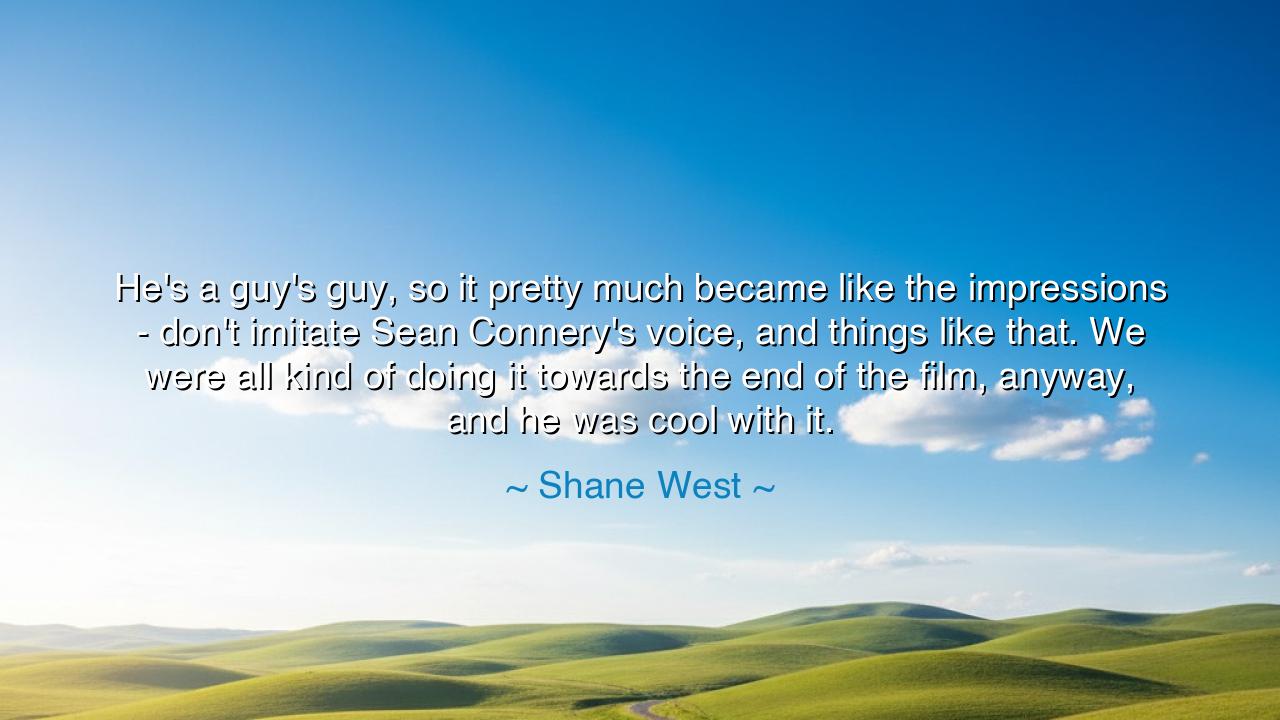
He's a guy's guy, so it pretty much became like the impressions -
He's a guy's guy, so it pretty much became like the impressions - don't imitate Sean Connery's voice, and things like that. We were all kind of doing it towards the end of the film, anyway, and he was cool with it.






On Brotherhood, Respect, and the Spirit of the Good-Humored Soul
When Shane West said, “He’s a guy’s guy, so it pretty much became like the impressions — don’t imitate Sean Connery’s voice, and things like that. We were all kind of doing it towards the end of the film, anyway, and he was cool with it,” he spoke not merely of jest or imitation, but of something far deeper — the timeless fellowship that arises when respect and laughter meet. His words carry the easy warmth of camaraderie, but behind them lies a lesson about humility, admiration, and the quiet dignity of the “guy’s guy” — the person so self-assured, so comfortable in his own skin, that he can laugh even when the joke is upon him.
To call someone a “guy’s guy” is to recognize a soul who stands firm and unpretentious among his peers — one who commands respect without demanding it. Such a man, like Sean Connery, embodies the balance between strength and approachability, discipline and humor. His presence elevates those around him not through authority, but through example. He does not need to defend his stature, for it rests upon a foundation of earned esteem. And so, when West and his companions found themselves imitating Connery’s legendary voice — that deep, unmistakable rumble that had enthralled generations — it was not an act of mockery, but of affection. It was the natural tribute that friendship and admiration pay to greatness.
In saying that Connery “was cool with it,” West reveals the heart of wisdom. True greatness is not fragile; it does not fear imitation. The truly strong are those who can laugh with those who imitate them, for they understand that humor is not the enemy of respect — it is its companion. The ancient philosophers would have praised such character. Socrates, mocked often by the youth of Athens, never raged at their imitations; he knew that laughter is a mark of human closeness, and that to be remembered in jest is still to be honored in spirit. The petty man takes offense at being mimicked; the wise man smiles, knowing it is a form of reverence.
Consider the story of Alexander the Great and his soldiers. During the long campaigns across Asia, the troops would sometimes parody their leader — mimicking his walk, his gestures, his proud manner of command. Rather than punish them, Alexander laughed. He understood that their imitation sprang not from contempt, but from familiarity. They loved their king as one of their own, and in their teasing was a sign of deep affection. Like Sean Connery, Alexander knew that to inspire such warmth was a far greater victory than to demand fear. For fear fades, but respect rooted in friendship endures.
This story — of imitation turned to camaraderie — reminds us that the essence of leadership and friendship is found in humility. The one who can bear to be laughed at, and still smile, possesses a power greater than that of any conqueror. It is the power of the heart, the ability to hold one’s pride lightly. Connery’s calm acceptance of his peers’ playful impressions reveals not vanity, but confidence — the serene assurance of one who knows that imitation cannot diminish what is real. In this lies a lesson for all: that our true worth is not lessened when others jest, for what is genuine needs no defense.
And yet, West’s recollection also teaches us about the sacred rhythm of human connection. On the set of a film — a place of long hours, tension, and creative striving — laughter becomes the bond that eases the spirit. Through humor, barriers fall; through shared amusement, respect deepens. This is how friendships are forged in the furnace of labor: not merely through shared work, but through shared joy. The “impressions” West speaks of were more than mimicry — they were the unspoken ritual of fellowship, a reminder that even the great and the ordinary stand as equals in laughter.
The lesson, then, is both simple and profound: be cool with it. Like Connery, learn to meet imitation, criticism, or jest not with anger, but with grace. Know that those who admire you will, in time, mimic you — and that this, too, is a form of love. Cultivate the strength to laugh at yourself, for humor disarms vanity and keeps the soul humble. Be the “guy’s guy” — or woman of equal spirit — who welcomes friendship over formality, who commands respect without demanding it, and who remembers that laughter, when shared, is the truest mark of respect.
Thus, in Shane West’s seemingly casual reflection lies a timeless teaching: greatness does not reside in pride, but in ease; not in distance, but in connection. Let us, then, walk as the wise do — steady, kind, and unafraid of laughter — knowing that to be remembered with warmth, and to inspire joy among peers, is the highest honor of all.






AAdministratorAdministrator
Welcome, honored guests. Please leave a comment, we will respond soon